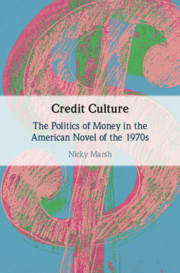Book contents
- Credit Culture
- Credit Culture
- Copyright page
- Dedication
- Contents
- Acknowledgements
- Introduction
- Chapter 1 No Place Like Home
- Chapter 2 Don DeLillo and American Credit
- Chapter 3 William Gaddis and Corporate Credit
- Chapter 4 When Women Counted
- Chapter 5 Toni Morrison and the Promise to Pay
- Chapter 6 Dorothy’s Endless Return
- Notes
- Index
Chapter 3 - William Gaddis and Corporate Credit
Published online by Cambridge University Press: 25 June 2020
- Credit Culture
- Credit Culture
- Copyright page
- Dedication
- Contents
- Acknowledgements
- Introduction
- Chapter 1 No Place Like Home
- Chapter 2 Don DeLillo and American Credit
- Chapter 3 William Gaddis and Corporate Credit
- Chapter 4 When Women Counted
- Chapter 5 Toni Morrison and the Promise to Pay
- Chapter 6 Dorothy’s Endless Return
- Notes
- Index
Summary
This chapter explores the emergence of a new culture of corporate credit in the 1970s, one specifically tied to the corporate self and the practices of financialisation that supported it. It examines the ways in which these cultures were supported by the self-affirming logic of neoliberalism that was capable of rejecting the very possibility of perceiving the world outside of its own terms. It argues that William Gaddis’ novel JR draws on an alternative history of post-war economic thought, one associated with Norbert Weiner rather than Milton Friedman, which offers a critique of the positivist triumphalism of 1970s economic thinking. It reads JR through the potently ambivalent idea of entropic failure – one that suggests an entirely different conceptual trajectory for understanding the meaning of the emerging debt cultures in this decade.
Keywords
- Type
- Chapter
- Information
- Credit CultureThe Politics of Money in the American Novel of the 1970s, pp. 75 - 100Publisher: Cambridge University PressPrint publication year: 2020

